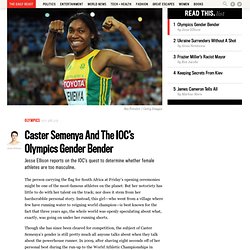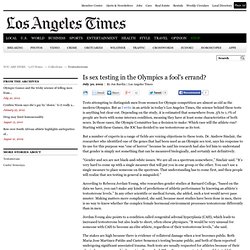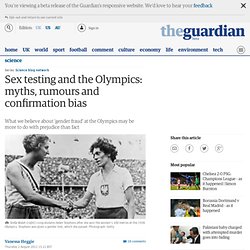

The Olympic Struggle Over Sex - Alice Dreger. Even as it hopes to clarify the difference between male and female athletes, a new rule from the International Olympic Committee inadvertently stirs the waters.

A set of Olympic rings hangs from London's Tower Bridge. (viks2/Flickr) What is sport ultimately for? That fundamental philosophical question lies behind the debate over what to do with women athletes who were raised as girls but whose bodies seem to be unusually masculine. And in that debate, two clear philosophical camps have emerged.
One camp, led by the International Olympic Committee (IOC), believes the line imposed between putative male and putative female athletes must be biological. But the Anatomists still think we should base our sex division in sports on some sort of biological feature, even if it means we have to just pick one. And so, the IOC has just decided that, for the London Olympic Games, the rule of sex will be based on something called "functional androgens" (or "functional testosterone"). Caster Semenya And The IOC’s Olympics Gender Bender. Jesse Ellison reports on the IOC’s quest to determine whether female athletes are too masculine.

The person carrying the flag for South Africa at Friday’s opening ceremonies might be one of the most-famous athletes on the planet. But her notoriety has little to do with her talent on the track; nor does it stem from her hardscrabble personal story. Instead, this girl—who went from a village where few have running water to reigning world champion—is best known for the fact that three years ago, the whole world was openly speculating about what, exactly, was going on under her running shorts. Though she has since been cleared for competition, the subject of Caster Semenya’s gender is still pretty much all anyone talks about when they talk about the powerhouse runner. In 2009, after shaving eight seconds off of her personal best during the run-up to the World Athletic Championships in Berlin, the rumors that had long swirled around the now 21-year old athlete reached a fever pitch.
Olympic sex testing bound to fail, experts say. Tests attempting to distinguish men from women for Olympic competition are almost as old as the modern Olympics.

But as I write in an article in today’s Los Angeles Times, the science behind these tests is anything but clear-cut. Depending on the study, it is estimated that somewhere from .5% to 1.7% of people are born with some intersex condition, meaning they have at least some characteristics of both sexes. In those cases, the Olympic Committee has a decision to make: Which race will the athlete run? Starting with these Games, the IOC has decided to use testosterone as its test. But a number of experts in a range of fields are voicing objections to these tests. “Gender and sex are not black-and-white issues. According to Rebecca Jordan-Young, who researches gender studies at Barnard College, “based on the data we have, you can’t make any kinds of predictions of athletic performance by knowing an athlete’s testosterone levels.”
“This is a solution in search of a problem. Sex testing and the Olympics: myths, rumours and confirmation bias. Confirmation bias is an interesting psychological trick the human brain plays on us, making sure that we are more likely to notice evidence that supports our beliefs than evidence that contradicts them.

Oddly, some sort of confirmation bias seems to be going on in the stories and articles written about sex testing and gender fraud in sports. Sex and gender identities are deeply personal, private matters, and are hard to investigate. When it comes to sex testing, writers tend not to study original sources or dig around in archives, but rely on existing, recently published material. This isn't an unusual way to write, but if no one is double-checking with the original material, mistakes can "go viral" and are repeated until they are accepted as facts. Heinrich Ratjen and Stella Walsh Take the most famous case of gender fraud: Dora/Heinrich Ratjen, the German high-jumper who competed at the 1936 Berlin Olympic Games and was later revealed to be a man. Olympics struggle with ‘policing femininity’ PRETORIA, SOUTH AFRICA— There are female athletes who will be competing at the Olympic Games this summer after undergoing treatment to make them less masculine.

Still others are being secretly investigated for displaying overly manly characteristics, as sport’s highest medical officials attempt to quantify — and regulate — the hormonal difference between male and female athletes. Caster Semenya, the South African runner who was so fast and muscular that many suspected she was a man, exploded onto the front pages three years ago. She was considered an outlier, a one-time anomaly.
But similar cases are emerging all over the world, and Semenya, who was banned from competition for 11 months while authorities investigated her sex, is back, vying for gold. Semenya and other women like her face a complex question: Does a female athlete whose body naturally produces unusually high levels of male hormones, allowing them to put on more muscle mass and recover faster, have an “unfair” advantage? Dr.